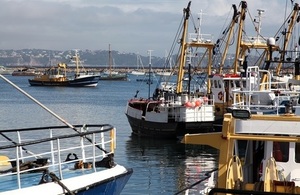Legislation creating the powers for the UK to operate as an independent coastal state and manage its fish stocks sustainably outside the EU is being introduced into Parliament today.
The Bill ends current automatic rights for EU vessels to fish in British waters. In future, access to fish in UK waters will be a matter for the UK to negotiate and to decide on the rules that foreign vessels must follow says the Government
As well as powers to implement new deals negotiated with the EU and other coastal states, set quotas, fishing opportunities and days at sea, the Bill includes new measures for Devolved Governments and a single set of UK-wide fisheries objectives to ensure that fish stocks, and the marine environment, are better protected.
Changes to funding rules enabling the UK government to provide financial support for the breadth of what is currently funded by the EU’s European Maritime and Fisheries Fund, such as training and port improvements, are also included in the legislation.
However the Government risks triggering a tough response from Brussels if it limits access to its waters with the majority of the EU catch made in the North East Atlantic, of which British waters are a crucial part and The EU has explicitly linked the City of London’s future market access to Britain giving ground on fish
Environment Secretary Theresa Villiers said:
This new Fisheries Bill takes back control of our waters, enabling the UK to create a sustainable, profitable fishing industry for our coastal communities, whilst securing the long term health of British fisheries.
Leaving the EU’s failed Common Fisheries Policy is one of the most important benefits of Brexit. It means we can create a fairer system which will allow marine habitats to thrive, with new powers to support our fishing sector and conserve our wonderful Blue Belt at home and abroad.
Commenting on the Fisheries Bill Helen McLachlan, Fisheries Programme Manager for WWF, said:
“We welcome the bill’s acknowledgement of the role fisheries play in delivering our net zero commitments. But if legally binding, sustainable fishing limits are introduced, we urgently need compulsory onboard cameras to help monitor and enforce them. The new plans for fish stock recovery are a step in the right direction, but they must be ambitious, implemented quickly and backed by investment, if we’re going to achieve true ocean recovery.”
The Fisheries Bill is an important opportunity for the Government to introduce truly ambitious fisheries management.
UK waters are among the most heavily exploited in the world and overfishing is the biggest cause of marine biodiversity loss in the last 40 years. Unsustainable fishing practices are also driving climate change, by damaging vital marine habitats which store carbon.
Ending overfishing in UK waters will not only help tackle climate change and restore our precious marine ecosystem, it will also bring transformative change to our coastal communities and will be key to supporting a thriving industry.






